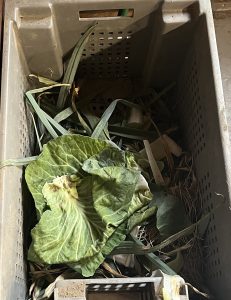When I recycle, I take personal responsibility to make sure I am conscious of what I can recycle. This is something that I do to help the work of those who then have to take it from the front of my house. Especially when it comes to plastics, I check the recycling number of each item to ensure that they can be taken to the recycling center. I also take it upon myself to make sure that the plastic is as clean as possible, removing any food and rinseing it off. I try to remember to remove the labels, but I do not always remember. This is the responsibility that I have given myself because I can, meaning I have the time and resources available to me for me to take these extra steps. The moment that the recycling leaves the front of my house I no longer feel responsible for it. I do not know if my efforts help in any way or if it all just ends up in landfills. I have not researched how my recycling center follows through and how they process the plastic. Because I do not have access to the recycling I don’t hold any responsibility for it, the kind of “out of sight out of mind” mindset. I think that taking the responsibility of sorting recycling is not something that everyone can do. I believe that there should be more transparency on what happens once your recycling or trash is picked up. I think that people would be more inclined to do more if they were able to see that it makes a difference. In my years of recycling I have not thought much about waste workers, I have only become more aware of them because of my own research and discussions like the ones that we have in class. I do not know what their work is like, I can only imagine from what I have heard and read. I imagine that their work involves a lot of sorting, each type of plastic is recycled in different ways and there are entirely different procedures for other materials like paper and cardboard. I also think that there is so much that they have to throw away due to them not being able to process it.
Responsibility and waste workers
When sorting through trash and recycling at home, I feel a responsibility to identify recyclable and non recyclable items and categorize them accordingly. In reality, I don’t know much about what happens to these waste items after they are picked up, and I don’t know how effective recycling even is at mitigating environmental damage. I guess I assume that once the trash and recycling is picked up, the trash will find its way to a landfill and the recycling will be repurposed and “recycled” into new products. I’ve heard that in some places, even entire states, recycling may not be recycled at all. When I lived in AZ, my apartment had recycling bins, which I used, but I heard from multiple people that it all ended up being funneled into the same landfills. I never bothered to fact check this, but I guess I thought that the second the trash was picked up, the matter was out of my hands and it was no longer my responsibility. I couldn’t control where it went, so I didn’t bother thinking about it that much. It’s odd, because I guess I sort of assume- and I think a lot of other people do too- that doing a good job of sorting and categorizing household waste is a decent stand-in for reducing the amount of waste produced in the first place, and that by doing that, I am doing my part. I know logically that this is not the case.
I have never really thought twice about the nature of the work of the people who deal with our trash. Stating it like that, it doesn’t sound good, but I have hardly ever seen or interacted with the waste workers who have picked up my trash. I put the trash out, and then, at some point, it is picked up. The next week I do it again. It’s just a routine that is sort of second nature and I’ve never thought deeply about it. I imagine that it is difficult work, physically hard, smelly, potentially pretty draining. When I was a little kid I did a tour of an incinerator- I honestly can’t remember the circumstance- but I do remember it was very very loud. Working in a place like that, I’d imagine you’d need good ear protection in order to not do permanent damage to your hearing. It doesn’t seem like glamourous work, although it is very important in our modern world, and these workers are part of the backbone of society. If nobody was doing these jobs, our world would probably be a complete mess. Even so, we need to focus as a society a lot more on reduction of waste, and that is all of our responsibility, along with companies and corporations that are producing our products and marketing them to us.
Responsibility and Waste Workers

Today I rescued a metal thermos that someone had thrown away because the handle of it started to fall apart and the paint is chipping on the edges. I thought that it would be completely fine. I washed it out thoroughly with hot water and soap and will wash it one more time before I use it, just because I like things to be clean before I use them after trading hands. There is a chance that there was a perfectly normal reason for the person to get rid of the thermos. I think it is in good condition, it just doesn’t look brand new anymore. There are all sorts of things that are thrown away all the time that I feel like should be able to be given or taken by waste workers without any repercussions of any kind. There is a social structure of thinking that waste workers are less than because they deal with other people’s trash, but if we didn;t have these essential workers in our public works then our everyday lives would look very different. There is a great possibility that excess trash and waste would be thrown about on the streets of cities more than they already are. Along with the waste we would have piling up in our lives, our houses, and yards.
Responsibility
This past week in our dining hall, a sign indicating new things that could be incorporated into the food waste bin was posted. Based on my own experience and class discussions, this was not something students were made aware of prior to or when they were installed. This sparked many conversations with others about how people felt about the poor communication surrounding this change. Even before this act, I’ve heard many complaints about the limited number of composting bins around campus, specifically their lack of presence in the residences. If the campus wants to implement composting on campus, education about why and how we should do this is key. Going along with this, consistency across campus is also very important. I feel like a lot of people have a hard time properly disposing of things because they are not expecting the ways the waste should be organized and they are not used to it. I think when it comes to the physical act of disposing things, a fast speed is praised. When it comes to waste workers, both the workers and customers want the work done as quickly as possible. I feel this translates when we ourselves are disposing of something. For me, I know that no matter how long I spend in the dining hall, whether it is 20 minutes or 2 hours, I spend less than a minute disposing of my waste. If I am honest, I find myself irritated if there is a line in front of me to do this and find myself guilty of taking too long if there are individuals behind me. This contrast inspires me to be more present and patient during these moments. When it comes to responsibility, I think it first is in Hampshire’s hands to properly educate, communicate, and be consistent about waste management. Of course, too there does have to be a willingness to learn from the campus, so that’s when the people’s responsibility comes into play. Once disposed of, the waste workers now have the responsibility, and I would argue the right to take whatever they want from it. Quick side note: I am curious if Hampshire has any policy surrounding this! If I do have waste in my room, I do feel responsible for it for a longer duration of time, but in regard to food waste, I try to always place that in common waste bins, in an effort to disassociate myself. Overall, our readings this past week have encouraged me to educate myself more on composting opportunities on campus, in order to properly participate in them.
Hoarding and Cleaning
There are so many things in my life that I believe people would call me a hoarder for having. I collect things from my travels. All sorts a small things that remind me of the places I’ve been around the world. It is a really great thing to do if you scrapbook, but I have a hard time remembering to put them in scrapbooks then you justhave a collection of random things that you eventually forget where you got them. The holding on to things even when you don’t need them would qualify me as having hoarding tendencies. The only difference that I would justify is that I have the intention to use them in a meaning fun scrapbook but just never get around to it, which is a shame. For example, I have a small collection of small ripped up paper from the netherlands and the UK that I got this last summer. They have very little value and mean nothing to everybody but me. I have held on to them and now they hold a special place in my mind just for them. The memories that come out of them make me smile and thats why I’ve held on to them. Its a great reminder that a different world is out there. Another example is the amount of clothing I have. I have much of my clothes from my childhood that no longer fits that I keep because I want to have the remembrance of wearing them. Along with wanting to give them to my kids when I grow up. I think that hoarding has to do a lot with the past experience of people. There is a chance that If people grew up without having things that were stabbly their own, then they might feel the interest to hoard things that are now their own things. A coping mechanism that makes them trust themselves and their things more. Just a thought.
Dirt: Matter Out of Place
On the typical day of me working on the farm, we see a lot of produce that goes bad. There is an entire food production process that throws away produce that seems to be a little bit hard. In my mind, I have a hard time throwing away food. It takes a lot out of me to toss away perfectly good food that no one wants to buy. The farmstand I work at, has to throw away produce once it starts going bad so that it doesn’t make the rest of the produce rot also. A good example of this is the tomatoes, they go bad quickly and take out a couple previously good tomatoes with them. The problem with people thinking that food is waste, is that people are less considerate about where and when we decide that produce is no longer good to each. I think eating rotten vegetables is really nasty but at the same time I believe that there is so much produce at local farms that would still be perfectly good to give to food pantries and community kitchens. There is a community of homeless people that lives in the small cities around here that I believe would have a much better time getting good produce if the farms were able to give produce directly to them. I don’t believe that the food ‘waste’ I make in my house is bad because we have chickens to eat the scraps.

Shit
In today’s culture, shit is seen as a dirty substance we no longer want in our bodies. Along with no longer wanting it around us in general, by creating indoor plumbing systems that sends our shit away from us so that we never have to deal with it again. There are figures of speech around shit and many jokes made in the media that reflect the ideas many people in society hold around shit. In the farming communities around the world, animal shit is incredibly valuable. Refreshing the fields with new nutrients each time it is put into the soil. Society tells people what they should think, by when it comes to what comes out of our bodies we can’t change that. Everyone poops. It’s true, there is no animal on this planet that doesn’t shit. Through the readings many things came into the light for me, almost all of the first outhouses and bathrooms in the US were absolutely disgusting. The photos shown in Gerling’s article captured a very gross version of what bathrooms used to be like in cities. I would never want to live in today’s day and age without indoor plumbing. I can imagine a perfectly fine world in which I could live without indoor plumbing systems.
Individual Responsibility
Well, I recently had a security guard throw away a light stick that I had for almost 6 years now. Sadly, I couldn’t retrieve it because it was during a concert I went to. I didn’t take a photo because I was holding up the line and it really made me sad because it was the very 1st concert light stick I bought. So I cannot really answer this blog that well. They threw it away because apparently it wasn’t “allowed” but when I stepped in, I saw other people with your group’s light sticks which made me so down.
Shit
My everyday behaviors around shit reveal about our culture, history, or power relations making me think about what type of world we live in. Everyone knows that they can make a good decision that makes a huge difference for the world. In the world that we know today, it’s hard to understand and talk about colonialism and racial hierarchies. They’ll think “Oh, I’m more above your level now, I can do this and whatever I want to” which is an abuse of power. Yet, they can make a difference, they just want others to judge them.
Matter Out of Place
An object in our daily everyday life is paper, plastic, and food, which are typically considered as waste. 
Mary Douglas’ conception of dirt helps us to understand why this is waste because we package our food in paper containers or containers made of styrofoam. We use plastic cups for our drinks and throw them out. We eat food, but we throw away food or leftover food which is considered as waste. This type of waste can be used for composting to feed our plants or trees the vitamins they need.